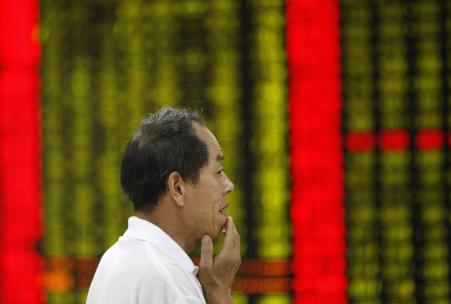By Owen Davis -
Stock markets are the one part of Chinese society the Communist Party can’t control. Despite the extraordinary measures Beijing has rolled out over the last three weeks to ensure the stability of markets in Shanghai and Shenzhen, Chinese stocks plunged farther Monday than on any day since 2007.
The dramatic correction, which sliced 8.5 percent off the Shanghai Composite Index, ended a state-sponsored three-week rally, raising concerns that China’s massive equities bubble might outweigh the government’s ability to maintain calm.
“This is proof that the Chinese authorities simply cannot stop the inevitable,” said Tom Elliott, international investment strategist at the DeVere Group, an international financial adviser.
But analysts say the selloff won’t deeply affect the economic health within China or outside its borders, owing to the relatively slim share of Chinese households invested in the markets.
“The global effects will be very small,” said Nicholas Lardy, a senior fellow at the Peterson Institute for International Economics. “I wouldn’t say don’t worry. But for international investors I’d say don’t panic.”
'A Stage-Managed Rally'
Though the causes of the rout Monday weren’t immediately clear, investors have shared concerns that China’s government began easing up on some of its equity-buying programs Monday, letting the bottom drop out of the sensitive market.
After Chinese markets climbed down from their speculative peaks in late June, Beijing took an unprecedented series of steps to mollify investors and stem an outright crash. Anchored by programs to buy up blue-chip stocks and support margin-lending operations, the efforts have mobilized at least $800 billion, Reuters reported.
At the same time, the government closed the faucet on selling, at one point restricting transactions on more than 70 percent of publicly traded stocks. “Malicious short sellers” faced prosecution. Taken together, the measures were severe enough to invite concerns from the International Monetary Fund, which reportedly advised Beijing to use a lighter touch in its market interventions.
Still, the government’s efforts managed to inspire some confidence. In the two weeks after July 8, the Shanghai Composite rose more than 17 percent.
Hopes of a sustained comeback died hard Monday, however, with little evidence on offer as to why. “It was a stage-managed rally, and the government hasn’t been able to stage-manage the decline,” Elliott said. More than 1,700 stocks fell by 10 percent, the maximum allowed before automatic brakes come into effect.
Government support, it seemed, was nowhere to be seen. “It’s hard to know how to interpret this,” Lardy said. “We don’t know how much the government has bought and whether it has stopped.”
Speculative Fervor
What is more certain, analysts say, is the limited effect the latest dip is likely to have on the Chinese economy, as well as markets abroad.
Only a fraction of Chinese families have taken a hit. While some 30 million retail investors crowded into Chinese markets in the first five months of 2015, the share of Chinese households directly invested in stocks remains limited, just 8.8 percent in the second quarter of 2015, the state-owned China News Service reported.
Equities make up less than 15 percent of household wealth, with roughly two-thirds of Chinese savings held in cash or deposits. Studies have found that the wealth effects of China’s market boom in the mid-2000s were slight.
In part, that’s because equities don’t enjoy the same vaunted investment status as they do in the West, Elliott said. “A lot of Chinese investors are torn between treating the stock market almost as if they’re going into a casino,” Elliott said, “or as some kind of government-sponsored savings scheme.”
Though the latter type of investor is likely to be disappointed by recent declines, they don’t represent a majority of the rising Chinese middle class. More than a third of Chinese retail investors are younger than 30, and 80 percent lack a college degree.
But the speculative fervor of China's relatively few stockholders has helped push the market to stratospheric levels. At the height of the bubble, the Shenzhen Stock Exchange traded at a median price-to-earnings ratio of 121, compared to a healthy 18 among top U.S. stocks. Analysts use the ratio of a company’s share price to annual earnings to determine whether a stock is overpriced.
Great as China’s bubble may be, analysts aren’t concerned that its implosion will threaten other markets. Foreign exposure to Chinese equities is slight, with less than 3 percent of Chinese stock owned by foreigners.
Bad Debt
That doesn’t mean world markets are insulated from the vagaries of the Chinese economy. China's rout put a noticeable damper on American markets Monday. Commodity prices have slumped in recent months, with oil hitting a year-long low amid fears that China’s economic growth will continue slipping from its once double-digit pace.
Apple (NASDAQ:AAPL), too, was clobbered last week after announcing less-than-stellar results in China. The tech giant lost more than $60 billion in market share on news that Chinese iPhone sales dipped.
And concerns remain over rising Chinese debt, especially as the stock market continues to slide. In February, McKinsey calculated that Chinese debt totaled 282 percent of gross domestic product (GDP), nearly half of which was related to the country's troubled real estate sector. Meanwhile, the prevalence in China of margin lending -- loans made to investors with stock as collateral -- has raised the specter trouble in China’s banking sector.
Elliott predicts a banking crisis, if it were to spread, could result in a full-bore Chinese recession, whose effects on the world economy would be significant. But he sees this as only a distant possibility.
“Western commentators salivate when they read about massive amounts of debt in the Chinese banking and housing sector,” Elliott said. “I don’t see it coming. Beijing has the firepower.”
